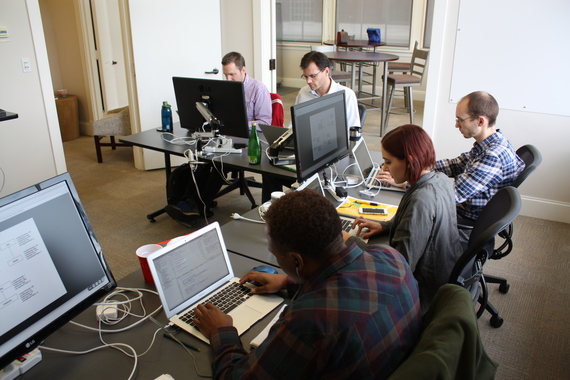Have you ever heard of the "Quarter Life Crisis"? It's that time in your twenties and early thirties where you take stock of your life and career, and determine that things are falling way short of expectations. There's usually a couple times a year when this comes into clearer focus; one is a birthday which always provides a good opportunity for self reflection, the other comes in the holiday stretch, the time between Thanksgiving and New Years where you find yourself answering lots of questions from distant friends and relatives about what you are doing with your life. If they've got you thinking, don't just paste over your career misery and knuckle down for another year. It's OK to at least consider a change.
I'm not in the business of relationship advice but if you're questioning your relationship with your career I can offer some thoughts on how to proceed. Below are some directions to consider as you ponder if it's time to move on -
- Should I stay or should I go? You may hate your current job but it's worth investigating the possibility of change within the company. Another boss, role or department may change the game entirely. Consider all of the roles you play in your early career as learning experiences. Are there experiences you can gain, or responsibilities you can assume that will add practical experience to further your career? If so, begin the conversations about opportunities to learn and grow at your current company. Find a senior leader who can sponsor your development. If you find that they are unresponsive or uninterested in your development, that's the sign that it's time to move on. But at least you know you tried.
Is it time to switch jobs? It's a bit of a myth that millennials are job hopping in ways that previous generations have not. Whether for increasing responsibility or the opportunity for a bump in pay, it's typical to see greater movement in the early stages of a career. The best advice I can give to job changers is don't get hung up on the money. Your pay needs to be enough so you feel respected and can make ends meet; but in the longer term if you are good, the money will come. Change jobs to gain experience and skills and you'll be able to monetize this later. Change jobs to gain exposure to leaders you can learn from because great managers and leaders play vital roles in career development. "Change jobs to gain exposure to leaders you can learn from because great managers and leaders play vital roles in career development."
A lot of the best opportunities are not advertised, and if they are, it's usually after the fact. If you haven't yet realized the critical importance of networking, it's time to wake up. Successful networkers will always expose themselves to greater opportunity than those who rely solely on online applications. Finally, when making changes, look for growth industries. A dynamic industry where growth and change is occurring will offer you more opportunities to assume responsibilities and prove yourself.
"If you haven't yet realized the critical importance of networking, it's time to wake up."
What can you do to "upskill"? If you are not building your skill set and knowledge base satisfactorily at work you'll have to look elsewhere. You may have heard the expression "Your 20's are for learning and your 30's are for earning". At minimum you should be shifting in your mid 30's from learning mode to earning mode. Sometimes backed by a generous employer, oftentimes inspired by career stagnation, the MBA has been the traditional "go to" tool for taking a career to the next level. But buyer beware: not all MBA's are created equal. There's dubious value associated with the output of the heavy advertising degree mills, and the top schools, whose reputations are known to boost earnings, must also be considered in the context of the combined cost of tuition and living expenses (elite institutions can cost you over $200k).
On the other end of the spectrum, whether it's Khan Academy, Coursera or Udacity, never has there been a time in history where so much great information is available for free to those who seek it. Even the citadels of learning have opened their doors to the rest of us, and minus a fancy scroll, the information is there for the taking. With high enrollment but low completion rates however, MOOCs (Massive Online Open Courses) are still struggling to fulfill their much heralded potential. Take a MOOC not for the credibility you might gain with an employer, but for the skills you might acquire and put to use, in turn leading to career advancement.
Finally, if it's a career in technology you are interested in, and particularly a role in the fast growing field of software and web development, you should be aware of the
that is underway. Paling in volume to the 7000 US-based institutes of higher learning, the 70 (and counting) coding bootcamps recognize that for most of us self-paced learning can be hard. These intensive, in-person, hands-on programs last on average 12 weeks and cost roughly $12k. The Coding Bootcamp has emerged as an elite kind of vocational school with competitive entry often requiring prospective students to pass coding challenges or
to qualify. So far the model is producing
in job placement and salary increases leading more and more students to explore this more affordable alternative to graduate school.
It's more true than ever that your career is yours to manage. You may have heard legend about the gold watch on retirement after 50 fine years of mutual loyalty, but those days are long gone. A quality relationship, whether romantic or career-based, is one where both parties perceive and receive mutual value. You only get one shot at a great career, so never settle for less than your potential and get out there and make the most of it!
Anthony Hughes is founder and CEO of Tech Elevator, a coding bootcamp, teaching novices to become software developers through an immersive 14 week program. Find out if a career in software development is the right path for you by taking a quick aptitude test .
Support HuffPost
Our 2024 Coverage Needs You
Your Loyalty Means The World To Us
At HuffPost, we believe that everyone needs high-quality journalism, but we understand that not everyone can afford to pay for expensive news subscriptions. That is why we are committed to providing deeply reported, carefully fact-checked news that is freely accessible to everyone.
Whether you come to HuffPost for updates on the 2024 presidential race, hard-hitting investigations into critical issues facing our country today, or trending stories that make you laugh, we appreciate you. The truth is, news costs money to produce, and we are proud that we have never put our stories behind an expensive paywall.
Would you join us to help keep our stories free for all? Your contribution of as little as $2 will go a long way.
Can't afford to donate? Support HuffPost by creating a free account and log in while you read.
As Americans head to the polls in 2024, the very future of our country is at stake. At HuffPost, we believe that a free press is critical to creating well-informed voters. That's why our journalism is free for everyone, even though other newsrooms retreat behind expensive paywalls.
Our journalists will continue to cover the twists and turns during this historic presidential election. With your help, we'll bring you hard-hitting investigations, well-researched analysis and timely takes you can't find elsewhere. Reporting in this current political climate is a responsibility we do not take lightly, and we thank you for your support.
Contribute as little as $2 to keep our news free for all.
Can't afford to donate? Support HuffPost by creating a free account and log in while you read.
Dear HuffPost Reader
Thank you for your past contribution to HuffPost. We are sincerely grateful for readers like you who help us ensure that we can keep our journalism free for everyone.
The stakes are high this year, and our 2024 coverage could use continued support. Would you consider becoming a regular HuffPost contributor?
Dear HuffPost Reader
Thank you for your past contribution to HuffPost. We are sincerely grateful for readers like you who help us ensure that we can keep our journalism free for everyone.
The stakes are high this year, and our 2024 coverage could use continued support. If circumstances have changed since you last contributed, we hope you’ll consider contributing to HuffPost once more.
Already contributed? Log in to hide these messages.

